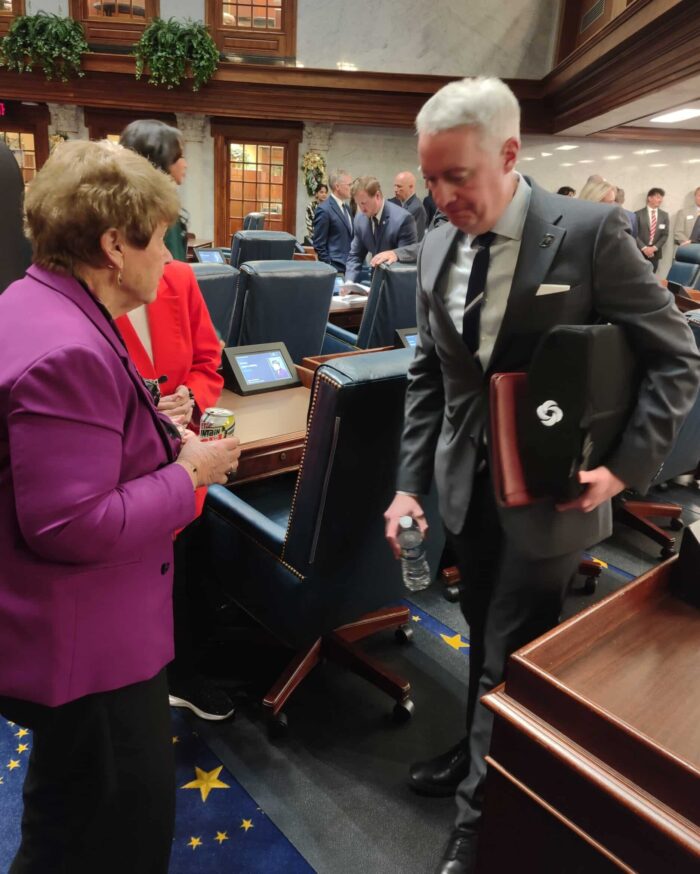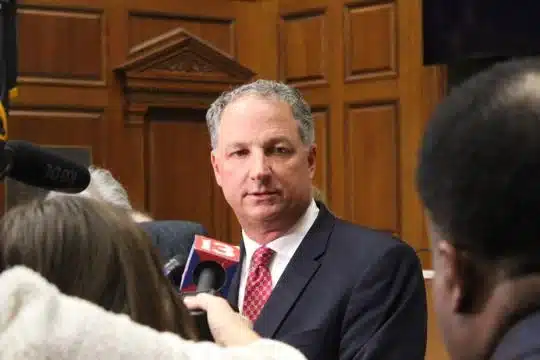
By Kyra Howard
The Indiana Citizen
November 20, 2025
The number of Indiana Republican senators facing threats of violence for opposing redistricting has increased, raising concerns among all lawmakers in the Statehouse.
Sen. Greg Goode of Terre Haute was swatted over the weekend after President Donald Trump named him on social media as being against the effort to redraw Indiana’s congressional map in order to give GOP candidates an advantage in the 2026 mid-term election. Since then, Sens. Spencer Deery of West Lafayette, Rick Niemeyer of Lowell and Dan Dernulc of Highland have all said they have been targeted with attempts of swatting attacks.
Also, Sen. Kyle Walker of Lawrence released a statement Thursday afternoon confirming he had also been a victim.
“Attempts have been made to intimidate me and threaten violence at my home,” Walker said, adding he was grateful to local and state law enforcement for their effort to keep him and his family safe and identify the perpetrators of this act. Then he called for a unified response from elected officials.
“All state leaders should send the strongest message possible that not only are these violent threats and intimidation tactics against the law, they are also counter-effective,” Walker said.
Indiana State Police said Thursday that it is investigating multiple attempts of swatting against state legislators, according to a report by 14 News in Evansville. State police said they were partnering with local, county and federal law enforcement to identify the individuals responsible and then seek criminal prosecution.
Swatting is when a prank call or false report is made of an emergency with the intention of provoking an armed response by law enforcement. Swatting can be dangerous and is often used as a form of intimidation, according to the National Association of Attorneys General.
Gregory Shufeldt, associate professor of political science at the University of Indianapolis, said the rise in threats and political violence is linked to the discontent and division in the country. Upending democratic norms or institutional practices, such as by redistricting in the middle of the decade, creates the perception that things are not fair.
“I would have to first broadly say that one of the key characteristics of our political climate right now is the high degree of ideological polarization and the high degree of competition between the two parties, and that often creates a setting where people do not feel represented,” Shufeldt said. “People feel like the other side—whatever the other side is—is a threat and does not have the best interest of America or all Americans. And so this increases the possibility of political violence.”

Deery released a lengthy statement following the incident targeting him and his family. He praised the professionalism and preparedness of the West Lafayette Police Department in recognizing the call was a swatting attempt. He also noted the swatting had been preceded the night before by someone having a pizza delivered to his home, conveying the offenders knew where he lives.
Deery indicated he was undeterred by the threat.
“It is disturbing that anyone would attempt to harm or intimidate lawmakers, but sadly not all that surprising in the current environment,” Deery said. “When our family decided to enter the public arena four years ago, we knew our lives would change, but we believed then— and still believe today—that it is important for people who are committed to representing the people with integrity and attitude of public service step up. We will continue to do our duty and to do what is in the best interest of our district, no matter the threats.”
The fight over mid-decade redistricting in Indiana has been intensifying since Gov. Mike Braun called for the Indiana General Assembly to meet in a special session presumably to consider reconfiguring the state’s congressional districts. Currently, Republicans hold seven of Indiana’s nine seats in Congress, but the Trump administration has been pressuring lawmakers to reshuffle the district boundaries to give all nine seats to the GOP.
After Senate President Pro Tempore Rodric Bray, R-Martinsville, and House Speaker Todd Huston, R-Fisher, brushed off Braun’s order and said the legislature would start its regular session early by reconvening in December, rather than gathering for a special session, Bray scuttled plans for the early session. He announced last week that the Senate’s Republican caucus did not have enough votes to support reconfiguring the maps.
Trump then lashed out at Bray and Goode on social media, saying they opposed redistricting, even though, at that time, neither had publicly stated their stance on redrawing the map.
“Senators Bray, Goode, and the others to be released to the public later this afternoon, should DO THEIR JOB, AND DO IT NOW! If not, let’s get them out of office, ASAP,” wrote Trump in a social media post Sunday morning.
During Organization Day, senators approved a resolution that says the upper chamber in the legislature will not return until early January. The resolution, which passed on a 29 to 19 vote, is seen as signaling that Indiana is rebuffing Trump and will not be redistricting.
Braun responded with a fiery, partisan statement, saying he was looking for ways to compel the Senate to take action.
“Unfortunately, Sen. Rod Bray was forced to partner with DEMOCRATS to block an effort by the growing number of America First Senators who wanted to have a vote on passing fair maps,” Braun said.
Lt. Gov. Micah Beckwith also entered the fight by describing the Senate’s decision not to redistrict as weakness.
“From here on out, whenever I introduce myself … whether it’s to one person or a thousand … I’m going to say, ‘I’m the Lt. Governor of the great state of Indiana … and the President of the WEAK Indiana Senate,’” Beckwith posted on social media.
Speaking to reporters following his address to the House on Organization Day, Huston condemned the threats of violence that, at that time, had only been made against Goode.

“It’s terrible, beyond disappointing and completely inexcusable,” Huston said.
He also noted the House has had a process in place to work with state and local law enforcement to protect the legislators. The legislative leadership has told the representatives to contact state police whenever they have concerns about their personal safety.
House Minority Leader Phil GiaQuinta, D-Fort Wayne, also denounced what had happened to Goode, saying the senator has been representing his constituents well and should not have to face intimidation or threats of harm
“It’s horrible,” GiaQuinta said. “(There’s) no place in our society to be doing that.”
Elizabeth Bennion, professor of political science at Indiana University South Bend, said swatting and doxing can have a long-term, damaging effect on political discourse.
American democracy, she said, is designed for debate and deliberation about important issues, but acts of political violence disrupt that contemplative process. Ultimately, the threats and dangers can cause legislators to shy away from raising controversial issues and discourage good people from running for reelection or even running for office in the first place.
“It is an attempt to silence people and to enforce a political action based on the threat of violence both to elected officials and to their families,” Bennion said. “This makes it very difficult for elected officials to do what is right for their constituents, for their community, for the state and for the nation as a whole, when they feel that their safety and their life are in jeopardy if they do not simply accede to the demands of those who are bullying them or threatening them.”
Dernulc said he was not deterred from continuing his work representing his district after he and his family were victims of a swatting attempt.
“It is scary and shocking to me that someone would go so far to try to cause harm or fear to me or my family,” Dernulc said. “I have always done my best to serve my community, be their voice, and work alongside them and my colleagues at the Statehouse to help make Indiana a great state. It is sad because of these efforts and work that I am villainized in some minds to the point of harmful retaliation. Threats to public officials cannot and should not be the norm.”
Across the aisle, Andrea Hunley, D-Indianapolis, said lawmakers should not have to fear for their personal safety for doing the work they were elected to do.
“That is critical that we are making sure that we’re protecting our colleagues, that we’re protecting our members, and making sure that folks can do the good work that they’re elected to do,” Hunley said. “No one should be murdered for their job here in the state legislature.”
Bennion and Shufeldt stated that curbing political violence will take more than condemning it after a major incident such as swatting.
“A larger examination of that political culture, our political rhetoric and our actions toward one another, including those in office, is needed,” Bennion said, “as well as a concerted effort to help people understand how they can make their voices heard and to provide nonviolent ways for people to feel that they can influence public policy.”
Shufeldt said when people feel they have a voice that can enact change in their government, they are typically less likely to turn to political violence. When, for example, the right to vote is taken away and when elections are not fair, he said, people can feel the government is not working for them.
“So, focusing on procedural reform so that people feel like they can affect change through the system surely reduces the frequency of political violence,” said Shufeldt.
“It doesn’t necessarily address all of it because sometimes political violence is done by irrational actors—most times that is the case,” he continued “But in general, if the institutional means are made widely available—it is easy to vote, it is easy to have free and fair elections, if you feel like your vote had a chance to affect the outcome—you’re less likely to engage in extra institutional forms of political participation or violence.”
Chloe White, a reporter with TheStatehouseFile.com, contributed to this story.
Kyra Howard is a 2023 graduate of the Franklin College Pulliam School of Journalism, where she was an award-winning writer for TheStatehouseFile.com. In 2025, she received third in the breaking news category of the Indiana Pro SPJ Best in Indiana Contest, third place for breaking news reporting in the Indiana Collegiate Press Association Contest and first place for breaking news reporting in the SPJ Region 5 Mark of Excellence Awards. All three awards came for her reporting on Rep. Jim Lucas showing his handgun to students protesting gun violence at the Indiana Statehouse in 2024, a national story she broke.
The Indiana Citizen is a nonpartisan, nonprofit platform dedicated to increasing the number of informed and engaged Hoosier citizens. We are operated by the Indiana Citizen Education Foundation, Inc., a 501(c)(3) public charity. For questions about the story, contact Marilyn Odendahl at marilyn.odendahl@indianacitizen.org.